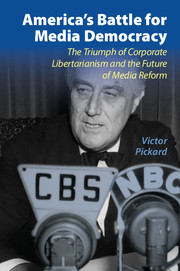 America's Battle for Media Democracy
America's Battle for Media Democracy Book contents
- Frontmatter
- Contents
- Acknowledgments
- Introduction
- 1 The Revolt against Radio
- 2 A Progressive Turn at the FCC
- 3 The Battle of the Blue Book
- 4 The Origins of the Fairness Doctrine
- 5 The 1940s Newspaper Crisis and the Birth of the Hutchins Commission
- 6 Should the Giants Be Slain or Persuaded to Be Good?
- 7 The Postwar Settlement for American Media
- Conclusion
- Bibliography of Primary Sources
- Index
- References
1 - The Revolt against Radio
Published online by Cambridge University Press: 05 October 2014
- Frontmatter
- Contents
- Acknowledgments
- Introduction
- 1 The Revolt against Radio
- 2 A Progressive Turn at the FCC
- 3 The Battle of the Blue Book
- 4 The Origins of the Fairness Doctrine
- 5 The 1940s Newspaper Crisis and the Birth of the Hutchins Commission
- 6 Should the Giants Be Slain or Persuaded to Be Good?
- 7 The Postwar Settlement for American Media
- Conclusion
- Bibliography of Primary Sources
- Index
- References
Summary
In 1940s America, radio was the preeminent communications medium, fully integrated into millions of households. Although its programs were much loved, grievances were also commonplace, particularly concerning overcommercialization. Access to a variety of high-quality programs was not guaranteed, especially in rural areas. Growing concerns around excessive advertising and the medium’s failure to reach its full democratic promise prompted grassroots activism and proposals for government intervention. In 1947, near the fortieth anniversary of his invention of the Audion tube, Lee de Forest, often considered “the father of radio,” wrote a widely distributed letter to the National Association of Broadcasters (NAB):
What have you gentlemen done with my child? He was conceived as a potent instrumentality for culture, fine music, the uplifting of America’s mass intelligence. You have debased the child ... made him a laughing stock.... The occasional fine program is periodically smeared with impudent insistence to buy or try.... Soap opera without end or sense floods each household daily. Murder mysteries rule the waves by night, and children are rendered psychopathic by your bedtime stories. This child of mine has been resolutely kept to the average intelligence of 13 years ... as though you and your sponsors believe the majority of listeners have only moron minds. Nay, the curse of your commercials has grown consistently more cursed, year by year.
De Forest’s anguish over how commercialization undermined radio’s potential as an enlightening and democratizing instrument – degrading it with excessive advertising and low-quality programming – echoed across much of the media criticism that was proliferating in the 1940s. The analysis that follows shows how these central critiques shaped media reformers’ intellectual arsenal and helped them move from criticism to activism. Following in a rich tradition that anticipates contemporary media-related crises and opportunities, this criticism reminds us that the modern American media system faced significant dissent. It resulted from a profound struggle to define media’s social responsibilities – and government’s ability to mandate them – in a democratic society.
- Type
- Chapter
- Information
- America's Battle for Media DemocracyThe Triumph of Corporate Libertarianism and the Future of Media Reform, pp. 9 - 37Publisher: Cambridge University PressPrint publication year: 2014
